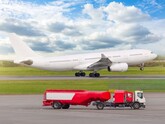
CFM conducted technical tests on the Chisinau-Revaca railway section as part of the planned launch of a new service between Chisinau railway station and the capital's airport
As noted in a statement by the state-owned company Moldova Railways (CFM), in particular, as part of preparations for the launch of the railway line, which is designed to significantly reduce travel time between Chisinau railway station and the capital's airport, CFM CEO Sergiu Cotelnic, jointly with a group of specialists, conducted technical tests on the Chisinau-Revaca railway section. The need for an experimental trip arose after repair and restoration work, including the replacement of worn sleepers and rails on certain sections, which made it possible to remove speed restrictions. The purpose of the tests was to assess travel time and preliminarily draw up a schedule for future regular trains on the Chisinau-Revaca route. During the tests, the train covered the 10-kilometer section from Chisinau railway station to Revaca station in 9 minutes, which is a positive result confirming the functionality and feasibility of operating the existing railway section. Technical assessments also revealed the potential for optimizing travel time by modernizing infrastructure and adjusting operating parameters. According to CFM, the campaign is part of a project to launch a railway line designed to significantly reduce travel time between the railway station and the airport. Earlier, Minister of Infrastructure and Regional Development Vladimir Bolea noted that passengers arriving at Chisinau Airport will soon be able to quickly reach the center of the capital by train, thanks to the implementation of the project, which is part of an extensive plan to modernize transport infrastructure and aimed at increasing the mobility and comfort of travelers. The project involves the modernization of stations and railway tracks to meet modern passenger transport requirements. According to the minister, by spring 2026, the stations will be fully adapted to receive passengers. It is expected that over time, the average speed on the section will increase to 50 km/h and travel time will be significantly reduced. // 27.11.2025 — InfoMarket.







